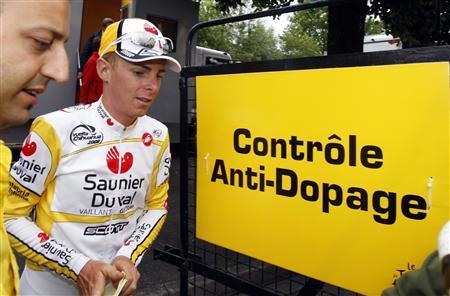Cyclists have grown weary of hearing about drugs and cycling. Why cyclists fail drug tests has become a favorite whipping post for journalists, sportscasters, and the public at large. But failing a drug test is not always cut and dried, black and white, and sometimes even the cyclists doesn’t know for sure what happened.
The Drive to Win
Cyclists are individuals. They rely only on themselves to win. The blame for losing is also on them — and not because someone else lost or failed. The drive to win is inherent in their competitive nature. The temptation to use drugs must be almost overwhelming at times.
Put in Perspective
The use of drugs in cycling is no more prevalent than it is in other sports. Just look at other athletes in competitive sports. It’s fairly obvious where the giant necks, shoulders and forearms come from. The reason why cyclists get so much press is because cycling is international. Cyclists are tested with more frequency, at higher, more precise levels than any other sport — even the most insignificant traces of a foreign substance shows up when you analyze someone enough. Cyclists are held under a microscope, and “innocent until proven guilty” has become “guilty until proven innocent.”
Banned Substances
The main reason why cyclists fail drug tests is because their blood or urine is tested and found to contain a banned substance. The list ranges from growth hormones (EPO) to noroxycodone, to benzoylecgonine to methylphenidate to plain old testosterone. The list goes on and on with most of the substances being unpronounceable names that only chemists can pronounce or understand. The World Anti-Doping Agency (WADA) is the guide and overseer that regulates the lists of prohibited drugs.
Too Many Red Blood Cells
Another drug failure has nothing to do with drugs. Blood doping, or boosting, is the practice of injecting yourself with your own blood. Scientifically known as “Autologous blood doping”. It is the transfusion of one’s own blood, which has been stored, refrigerated or frozen, until needed. Homologous blood doping is the transfusion of blood that has been taken from another person with the same blood type. If a cyclist’s blood is found to have a higher number of red blood cells than normal, he or she will likely fail a drug test.
Grey Areas
But there are grey areas; some cyclists fail because of an accidental exposure to detectable levels of banned substances through passive inhalation, in food, or in nutritional supplements. The debate about accidental exposure has raged on forever. Only the cyclists knows for sure.
Passive Inhalation
Passive inhalation is the ingestion of drug smoke such as marijuana. The problem is that analytical drug testing methods are incapable of distinguishing between a sample from a true cheater or a sample from a cyclist who was passively exposed to marijuana smoke.
Not an Excuse
Passive inhalation is not accepted as a plausible explanation for a positive test and some cyclists test positive with cannabis (typically registered as THC) in their system.
The Case Against Cannabis
Cannabis is often portrayed as a substance that has detrimental effects on performance. Cannabis decreases coordination, distorts spatial perception, alters perception and the awareness of the passage of time. It can be safely assumed that since cannabis seems to offer no real performance enhancing benefits, that recreational use or passive inhalation is a likely cause of positive test results. Again, only the cyclist knows for sure.
Tainted Meat
At the end of April 2014, former world time trial champion, Michael Rogers was cleared of doping as the UCI accepted that meat he ate in China was likely the cause of his positive doping test. In China, clenbuterol is widely administered to livestock to build muscle and reduce fat. Rogers then tested positive for clenbuterol in Japan a few days later.
You Are What You Eat
Meat in China and Mexico has always been a risk for cyclists. In 2011 FIFA found that players from 19 of the 24 teams at the Under-17 World Cup in Mexico tested positive for clenbuterol.
Health Reason Failure
Some fail drug tests because of health reasons. For example; low levels of cortisol, a naturally occuring steroid hormone, can cause cyclists to fail a drug test simply because of possible complications if an injury while riding. In this instance however, disqualifications are typically voluntary.
Supplemental Exposure
Some of the positive drug tests recorded by cyclists have resulted from the use of supplements and special sports foods rather than deliberate use of banned products. Here is a list of some ingredients in supplements and sports drinks that are either directly banned by the International Olympic Committee’s Medical Commission or that have been shown to cause a positive doping outcome in some people:
- Ephedrine
- Pseudoephedrine
- Strychnine
- Caffeine (if consumed in sufficiently high quantities to produce a urinary caffeine concentration of >12 µg/ml)
- Dehydroepiandrosterone (DHEA)
- Androstenedione, androstenediol
- 19-norandrostenedione, 19-norandrostenediol and related compounds
An Exemption
If your doctor deems a drug necessary and it’s on the banned substance list, a Therapeutic Use Exemption (TUE) can be obtained before racing or competing. A TUE is a pass for certain drugs issued by your doctor. Ultimately, though, the cyclists is solely responsible for the substances in his or her body.
There are a number of reasons why cyclists fail drug tests and regardless of the reason, it generally always comes down to the cyclist being responsible for what’s in their body. Some failures result from a deliberate attempt to get ahead while others are accidental. Either case results in a failed test and ban from the sport.
